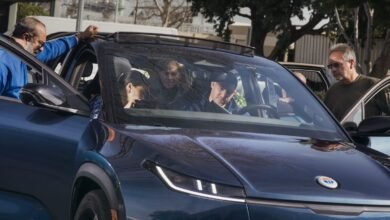When an EV Maker Failed, Its Customers Took Over

▼ Summary
– Cristian Fleming purchased a Fisker Ocean EV for around $70,000, attracted by its range and features, but the company collapsed into bankruptcy seven months later in June 2024.
– Early adopters were left with vehicles plagued by serious issues like battery failures and glitchy software, with no company support for repairs, rendering the cars nearly unusable.
– Owners formed the Fisker Owners Association (FOA), a nonprofit with over 4,000 members, to create third-party solutions, including a parts supply chain and software updates.
– The FOA has launched companies like UnderCurrent Automotive, which developed the OceanLink Pro app to restore basic EV functions for over 1,200 members.
– Despite severe challenges like safety recalls and plummeting resale values, FOA represents an unprecedented grassroots effort to sustain a modern EV fleet abandoned by its manufacturer.
Cristian Fleming envisioned his Fisker Ocean as the ultimate electric vehicle, a $70,000 investment in style, sustainability, and innovation, complete with unique features like the “California Mode” that opens nearly every window simultaneously. However, the dream quickly faded. Just seven months after his purchase in 2024, Fisker declared bankruptcy, leaving Fleming and thousands of other early adopters with vehicles suffering from battery failures, glitchy software, and faulty door handles. With the manufacturer gone, official support vanished, turning these premium EVs into expensive, problematic possessions.
Refusing to abandon their cars, these owners formed the Fisker Owners Association (FOA), a nonprofit that functions as a combination car club, tech startup, and rescue mission. Fleming now leads the organization, which has mobilized thousands of members to take control of their vehicles’ future. As FOA treasurer Clint Bagley notes, the passion for the Ocean remains strong, despite recurring frustrations like key fobs that suddenly stop working.
This grassroots initiative describes itself as the first entirely owner-controlled EV fleet. With over 4,000 members paying annual dues, the association generates significant funds to support its mission. While communities have historically rallied around defunct brands like DeLorean and Saab, those efforts centered on maintaining classic cars. The FOA faces a more dynamic challenge: providing real-time software updates and hardware support for a modern, connected electric vehicle.
The organization’s structure includes three specialized companies. Tsunami Automotive and Tidal Wave manage parts sourcing in North America and Europe, respectively, by salvaging components and commissioning new ones. A third entity, UnderCurrent Automotive, founded by former tech engineers, develops software solutions. Their flagship product, OceanLink Pro, is a third-party app that restores essential functions like remote battery monitoring for more than 1,200 users. A companion hardware device adds features like wireless CarPlay, addressing shortcomings the original manufacturer failed to resolve.
Industry analysts hold mixed views on the FOA’s long-term viability. Some, like Morningstar’s Seth Goldstein, see value in owners banding together to share maintenance knowledge. Others express astonishment at the situation. AutoPacific’s Robby DeGraff called it “wild” that owners must develop their own solutions, adding that it’s “pathetic” that company founder Henrik Fisker has seemingly disappeared.
Significant hurdles remain. Resale values for the Ocean have plummeted, with some trade-in offers as low as $3,000. Attorney Karl Barth, who represents owners in litigation, stated that some vehicles are “dangerous,” citing a recall affecting thousands of cars for a brake software issue. Meanwhile, a New York taxi company purchased over 3,200 unsold Oceans, but a potential partnership with the FOA on software updates fell apart over recall management disagreements.
Despite these challenges, the FOA continues its unprecedented experiment in consumer-led automotive support. The determination of these owners underscores a fundamental question: can a volunteer organization succeed where a billion-dollar startup failed? For now, the future of the Fisker Ocean rests in the hands of its most dedicated drivers, who are committed to keeping their cars on the road by any means necessary.
(Source: The Verge)
